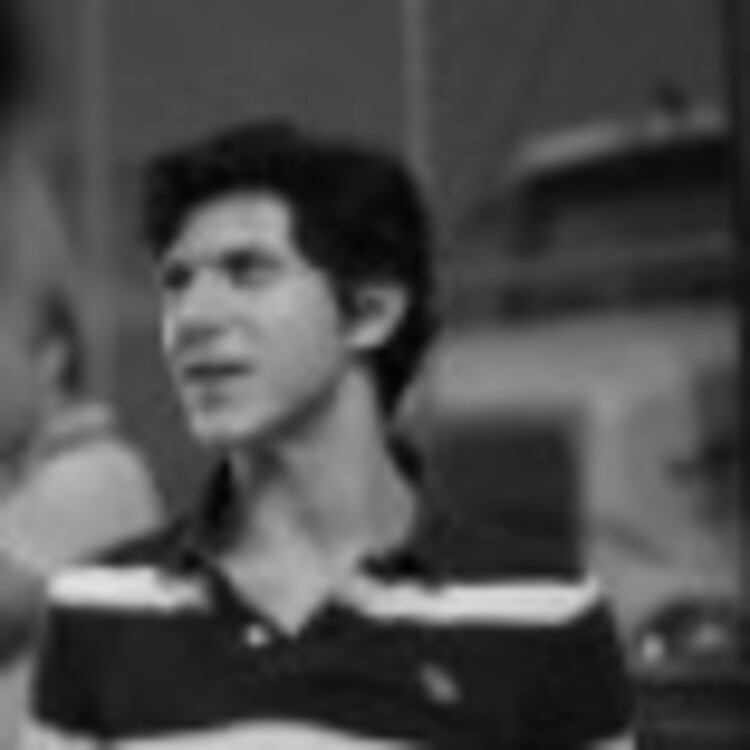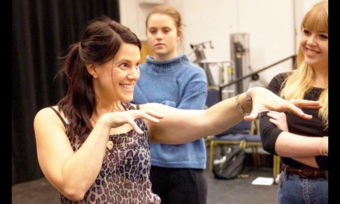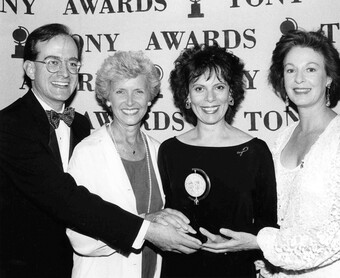Specialization and Its Discontents
Recently I had the opportunity to write and perform a new solo play. I had mixed feelings about taking on the project. After all, I hadn’t created a solo performance in more than five years, and had been focused solely on building a freelance directing career.
But in the midst of performing it, I was struck by how energized I felt, how thrilled I was to be telling a story directly from my heart. After so many projects where my role as a director was more about mediating an idea between a playwright and an audience, it was exhilarating to have my own ass on the line again. Afterwards, I thought, okay, great, done with that, now back to directing other people’s scripted plays.
A few weeks later, though, something happened that caused me to question the larger implications this might have on my career. I casually mentioned my performance to a lit manager friend, who was shocked by my creative moonlighting. He had no idea I had ever written anything, let alone four solo plays and several adaptations and original short scripts. Why did he have no idea? Because I had never told him. I had only ever presented myself to him as a new plays director. In fact, I had barely told anyone in my New York community about this project, or any of my past experiences as a writer. I am constantly inviting folks to come see work I’ve directed by other playwrights, but I found myself being secretive about my own creations. I realized that I was worried that if the word really got out in New York that I was interested in roles besides directing, it would somehow diminish my momentum as a director.
Like farmers who rotate crops to ensure that the soil contains a variety of nutrients, if I only direct, then my only perspective will be the director’s perspective.
Where did this belief come from? Certainly, the field is full of multi-disciplinary artists. Many of the folks whose work I admire most, including many who contribute in HowlRound, consider themselves to be “slash artists”: writer/director/performer/producers. But I know there are others out there like me who have felt pressure to specialize in one thing. Is that pressure internal or external? In other words, are the walls I want to put up between my various creative activities self-perpetuated, or has the field become so segmented that branching out, especially before you’ve reached a certain status, is impossible?
When I was younger, I didn’t worry as much about titles. I always did a lot of directing and assistant directing, but mixed in with that was traveling, teaching, studying, dramaturging, performing, and writing. Eventually, an offer to assistant-direct an Off-Broadway musical brought me to New York, where I chose to stay. Here, I was overwhelmed by the sheer numbers of “emerging” artists in each individual discipline. Each professional track (actor, writer, director, etc.) seemed to have its own set of hoops to jump through (actor training programs, writers’ groups, directing fellowships, etc.). I was reluctant to form a company, feeling that I lacked the necessary network to raise money, so I started down the winding path of a freelancer. I began to think of myself as a product for sale as opposed to an artist with a unique voice. To make myself the most efficient, market-friendly product possible, I decided not to bring my compound artistic identity around with me. (Forgoing Steve Jobs’ example, I stopped presenting myself as capable of making the whole widget.) Directing was the activity that first brought me to New York, and if I had to tick one box, directing definitely felt like the most complete expression of my creative identity. So I stuck with it. Certainly some of that decision to limit myself was specific to my own personal values and fears (and distaste for the word “auteur”). But some of it also was generated by emerging director programs which reward single-minded career focus over a more periscopic approach to making theater. Mentors told me to prepare an “elevator speech” to pitch myself to artistic directors and producers. That elevator speech had to be short, sweet, and to the point, and could therefore only include one handle. Either I was the musicals director, the new plays director, the classics director, the “edgy/experimental” director, etc. And no matter what, I was a director. Maybe two or three folks out there could really claim to have more than one “specialty” and they were decades older than me, more established, and/or had their own companies (the Hollywood parallel would be celebrity actors who try their hand at directing or producing or, recently, playwriting). Presenting myself as a director/writer, a director/monologist, or a director/adapter would only muddle the conversation and make me less hireable. After all, I only had those ten elevator seconds to make a solid, clear impression, or I’d be out of luck.

(Firework Theatre at 59E59, 2011). Directed by David F. Chapman
Now, several years after moving to New York, I’m well on my way to building a respectable freelance career as an “emerging new plays director.” I’ve leapt through some (but not all) of those requisite hoops, and I am building a solid community of actors, playwrights, producers, and theaters who are excited about me. Then, that tricky thing happened with the solo show. It felt good to make it, even though it was completely off my established path. It reminded me that I could be a generative artist, as well as an interpretive one (to use grantspeak). What if ... freelance directing alone is not going to satisfy me in the long haul? What if all those latent pursuits, especially creating my own work or running a company, have stopped waiting patiently on the sidelines and are demanding my attention? As I started sending out the solo play (on the advice of that lit manager friend), I thought, here I go, risking a hard-earned identity as a “one-hat” artist and slowly expanding my professional identity in the field.
I decided to use this moment as an opportunity to make a few overall changes in my professional life. To make room for new creative activities, something else would have to go. To create change, I would have to start saying “no” to some things. Polly Carl wrote very honestly about “no” often being a failure of imagination. While I believe that to be true in many cases, there are also occasions where “yes” represents the failure of the imagination. In this case, my overuse of “yes,”, especially to projects that didn’t especially excite or challenge me, led to a long postponement of a serious self-reflection about my career activities. Saying “yes” as an emerging artist in New York often means believing really hard that mediocre opportunities today will lead to better ones tomorrow. I don’t want to sound unappreciative for the many fun, small-scale projects I’ve been asked to do, but the fact is, some of those “yeses” could have been “nos.” However, turning them down often felt like career suicide, because, after all, “Who knows where it might lead?” Busyness is sometimes considered a measurement of success around here, so I completely filled my dance card to the point that I never stopped to examine how satisfying each experience was, or how I was growing as an artist on the whole. The solo show and several other deviations from the path (such as running a summer theater apprenticeship program for college students) have given me the courage and, frankly, the income, needed to press pause on what I had been doing and take stock of the bigger picture.
Even if I do continue primarily directing, my occasional creative forays elsewhere would be invaluable. My interpretive abilities as an artist are only as rich as my life experience. And if my sole creative activity is directing other people’s work, as challenging and exciting as that often is, my personal well may soon run dry. Like farmers who rotate crops to ensure that the soil contains a variety of nutrients, if I only direct, then my only perspective will be the director’s perspective. On a very basic level, by putting myself up onstage and performing something I had written, I reconnected with the risks that the actors and playwrights I collaborate with take every day. On a deeper level, making work about something that I cared about personally, and being solely responsible for both its creation and its execution, was an invaluable reminder that I too have something to offer to the conversation. I have experiences that audiences are interested in learning about, and perspectives that can influence or alter people’s ideas. I know that may sound obvious, but to me it was very profound.
My overuse of “yes,”, especially to projects that didn’t especially excite or challenge me, led to a long postponement of a serious self-reflection about my career activities.
From now on, I will dispense with elevator speeches. I will stop reducing myself to a sound bite or tagline. I will resist labeling myself as the go-to guy for a certain “kind” of theater or directing. Instead of leading with my director-self and asking what existing theater projects might require my directing services, I will lead with my artist-self, and create work by initiating conversations, by exploring topics that interest me or questions that challenge me, and then subsequently ask if I should frame that question as a director, playwright, actor, or producer.
Part of my motive for writing this post is to actively overcome some of my fear about introducing myself to the field as a “more than director.” The professional hit I may take by pursuing interests other than directing matters less to me than my desire to have a full and multifaceted life making theater. Yes, while I will still take freelance directing opportunities (I’m available!), I know now that is not the whole story, and that from now on I will no longer try to limit my creative contribution to the theater.












Comments
The article is just the start of the conversation—we want to know what you think about this subject, too! HowlRound is a space for knowledge-sharing, and we welcome spirited, thoughtful, and on-topic dialogue. Find our full comments policy here
Cue not cure.
This is my cure to say: David Chapman was a Cherub.
Thank you for this.
We need a better way to talk about and train for multidisciplinarity.
A hearty thank you for being so articulate and courageous.
From a fellow wandering freelance director sucked into the world of fellowships and a one track career.
thank you for daring me to put my hopes into play.
Hey, everybody--
Check out David's appearance in Huffington Post -- not only is it a great article feature, but it also contains a slasher self-identification right out of the gates from this post!
http://www.huffingtonpost.c...
I think you should carry a print-out of this article around and show it to people in elevators.
Seriously, though, thank you for speaking your mind so eloquently and honestly. I look forward to seeing the results of your theatrical cross-training. Your career will be richer for it.
Also, thanks, one more time, for inspiring me.
-mojlington
You are a light, David.
Your writing and your voice are compelling and raw... they echo many of my feelings about being an artist.
Way to share your take - I so look forward to witnessing whatever form your creativity takes in the time pockets to come.
Love,
Julie
I agree, David! Everyone is expected to be on a 'track' that is clearly delineated (director, writer, whatever....). I worked for many years in devised theatre as both writer and director, as well as community organizer with young people and community groups. That really pigeonholes you in other people's minds. When I came over to the UK and most people met me as a 'playwright' they were surprised to learn I had any directing experience. If find myself formatting and re-formatting my resume based on whatever role or track I'm trying to present myself in, and yet ALL of that experience is interlinked and has contributed to my theatrical identity....
As a recently reconstituted "slasher" I needed to be reminded that this is a valid, dare I say valuable, place to be in one's life. Here's to embracing our "artist-selves." Thank you so much for this.
Herr Chapman,
Thank you for the insightful and vulnerable post. I feel that more often than not, the director's voice is rarely acknowledged in the #newplay-osphere. Bravo, first of all, for making the audiences aware of the plight of the "emerging" director. Additionally, thank you for giving voice to some concerns that I share in this highly-competitive and careerist field. As a director who is interested in working in new opera and music theatre as well as making new plays with living writers and creating devised work and producing and curating and and and, I get tired of hearing the endless advice to hone that elevator pitch. What world do these advisors think we are living in? None of us REALLY makes a living doing this theatre thing, so we might as well do what we LOVE while we cobble together an existence. Being a contrarian, I often like to tell theatre people that I'm an opera guy and musicians that I'm a theatre guy. For me, always being on the outside of a genre helps shape my perspective and, I think, gives me an edge. But more recently I've felt like I've been chasing my tail of sorts. Thank you for encouraging me to embrace my eccentricities and divergent ambitions. And I'd love to see your solo show!
Rafael
Yes! Yes indeed!
I want to see your solo show here in New York!
Love this piece.
David-
I used to be of the mindset that if you were going to be an artist in the theater, you had to become an expert in one of the categories among the slashes; however, how can you become an expert, or genius at something if you have no new perspective? Steve Jobs created the "think different"campaign for apple, and apple hired him back because he was capable of just that. Thinking differently. Why? Because he gained perspective in the field by trying something new, and dabbling in other industries such as motion picture. By being a slash artist himself (director/creator/leader to name a few...) he revolutionized almost four industries: the telephone, the computer, entertainment, and music. Why is it that when we declare ourselves an artist you have to answer to "what kind'? I think the definition of an artist is exactly what you have written in your essay. You are a wonderful essayist as well. So put that in your slashes too. Excited to see what is next for you, and glad I now know you are no longer hiding your other creative selves from your friends and community.
As an emerging Director/Projection Designer, I regularly wrestle with questions related to professional branding. Many institutional leaders in our field rightly believe that to master either craft takes a rare combination of talent and commitment – and to find one person who can master both? Rarer still. As I’ve come to make my own peace with this reality, and actively commit myself to both careers (trusting that if I do good work the rest will take care of itself), another challenge has risen to the surface. Pursuing two highly competitive disciplines simultaneously requires twice the professional development time and effort.
As a New York “up-and-comer,” relationship building is a critical part of my work. Inevitably, the theaters that I am a good match for as a designer are not necessarily those that I should be looking to direct for. Thus, time spent designing and developing my design career invariably distracts from my efforts to develop my directing career, and vice versa. Even in a world free of “slasher” prejudice, I wonder if one can achieve the sort of success you already have as a freelance director while splitting focus between two careers?
Thanks for the comment, Erik.
I completely agree that mastery is difficult to attain in any one discipline, let alone several. I would never want to suggest casually piling on other professional pursuits on a whim. However, at least in my experience, some of the structures that hinder multiple careers are not about mastery.
(Note: counter examples abound. I fully acknowledge the many successful and masterful director/writers, actor/directors, and designer/directors out there, including some younger ones. They have figured something out that I haven't yet, which is why I wrote this post.)
My thoughts are really more about the creative process anyway. Whether it is internally or externally sourced, not believing that more than one mode of expression is available to you cuts you off from your potential.
I'd be interested to know why you pursue design opportunities at some theaters and directing opportunities at other ones. Is that an aesthetic choice, or a professional one? Do you feel taken more seriously as a designer than a director at big theaters at an earlier age, just because of the way the profession is set up? And are there any producers out there, in your experience, who celebrate your dual careers -- who want to hire you as a director/designer BECAUSE you are also a designer/director (not to do both jobs, but because you have both sensibilities)?
dfc
Thanks for your thoughtful response, David.
As you’ve no doubt experienced yourself, there are indeed a greater number of institutions willing to take a risk on an up-and-coming designer than a young director. Yet I have indeed had the good fortune to be hired as a designer and promoted to designer/director, as well as to get a job as a director specifically because my design experience made me the best director for the job. No doubt about it, my design career has helped to advance my directing career. Nevertheless, I often wonder if I’d be further along if directing were the exclusive focus of my professional development efforts.
These are the central questions that I struggle with as I work to balance both careers. That being said, I know with absolute certainty that I wouldn’t be artistically fulfilled if I weren’t doing both. I’m a “slash” at heart.
Thanks for this great, honest and inspiring article, David. It touches on so many things that I find myself struggling with right now as one of the multi-hyphenated among us. As an artistic director/teacher I feel a great responsibility to the artists that I am nurturing - to put myself, or my work, forward in any way can feel awkward, at times almost like a a betrayal. But the truth is if I don't own my identity as a playwright than how I can expect anyone else to?
There is so much to applaud in just stepping forward and saying it. Bravo!
I'm primarily a designer (lighting/scenic/sound) who is also a writer/director/performer. Occasionally performing makes me a better designer, and, since design is dramaturgy, my design work makes me a better writer and director.
We all contain multitudes. Every facet informs another piece of the art we make.
Thank you David, this is wonderful!
I will say that as a hybrid artist no matter the amount of explaining and defining you do, people will still very often identify you with a dominant characteristic/profession/talent. But that has almost nothing to do with you and almost everything to do with them and their own ability to digest their identity as anything more than one kind of artist/person.
On the the other hand the pressure to choose is partially internal. We all want to be seen. It's the most human thing about us. I understand fully the desperation in hoping for a shortcut. The more I embrace my own hybridity the more I realize artistic shortcuts are a myth. And even if they did exist, why would I want to take one??
If everybody were as simple as being just one thing and if the product of being just one thing was interesting to watch and rich in content, then we'd write plays in one draft and build characters and scenes in just one rehearsal.
But the truth is that every artist is or has the potential to be a hybrid artist. It's just that few are brave enough to admit it!
Appreciated this so much, Mr. Chapman! "It reminded me that I could be a generative artist, as well as an interpretive one (to use grantspeak)" Resounding encouragement your way!
So great, David.
Encapsulates perfectly the joy of mining the hidden corners of the soul of an artist. Love this article. Thanks.
D-Chap!
I think that self-identity in new means/ways is exactly something we tackled this summer, and what a wonderful expression you have now given to yourself!
As for the No's versus Yes's, I'm very happy to hear what you have shared, so often I find myself and others, such a young age-group, searching for absolutely everything to make us "stand out" or "get ahead of the competition" which lead me to a broader question. "What is Success?" Just a simple phrase one would think, but truly - what is success?
In chatting with a previous high-school substitute while I'm on break before Grad-School, we talked about success being so often and unfortunately based solely on the dollars you make and the life of wealth you lead. Now being in the industry doesn't ever necessarily negate that you or I or John Doe will ever be truly rich and successful, I think it requires us as artists to step back from the canvas we've created and realize the whole picture before we add more finishing touches to the entire work. Success for me personally, is a realization, did I have satisfaction from what I just worked on? If yes- then I was successful (even if I didn't get paid a penny) If no- then what could have made it more successful? Could I have influenced even one person to think differently?
I think a lot of this is part of an extremely important conversation that we had up at OP in June. "Don't be so quick to label yourself" as many people had re-affirmed to many of us. I remember taking the risk of doing that solo work, sure it hasn't panned out yet, but it made me more confident in what I am doing, and brought out my director side more.
In any way/shape/form- you're a stellar guy, and CORE CO loves you! :D
Be well!
Refuse to categorize!
Go David Chapman, go!
Wonderful, wonderful and yes again. (And so lucidly stated.)
I think the more arts you exercise, the more rich your experience will be, and the more you'll have to offer as an artist. There are so many directors and actors I'm encouraging to write their own plays (both in order to create their own opportunities, and because I want to hear what they have to say!).
Also, as an addendum, those who need artists to fit in one neat category are generally not people I'd want to work with.